
About Andrew Cusack
 Writer, web designer, etc.; born in New York; educated in Argentina, Scotland, and South Africa; now based in London.
Writer, web designer, etc.; born in New York; educated in Argentina, Scotland, and South Africa; now based in London. read more
News
Blogs
Reviews & Periodicals
Arts & Design
World
France
Mitteleuropa
Knickerbockers
Argentina
The Levant
Africa
Cape of Good Hope
Netherlands
Scandinavia
Québec
India
Muscovy
Germany
Academica
The Pope in Paris
Benedict XVI brings a message of love & hope to the City of Light
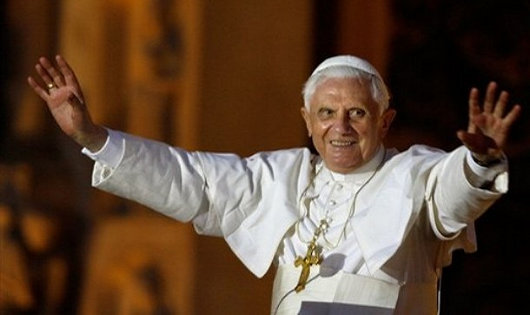
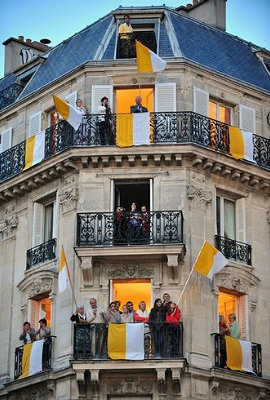 It is wholly appropriate that the motto of the city of Paris is Fluctuat nec mergitur: “Tossed by waves, she does not sink”. It would be hard to find better words to describe the Barque of Peter, whose Holy Father the Pope has spent the past two days in the French capital. From time immemorial, France has been described as “the eldest daughter of the Church”, its primatial see of Lyons established in the second century and Clovis, its first Christian king, receiving baptism in 498. But alongside the 1,500 years of Christianity, France has, for the past two centuries, also been a font of revolution and disruption — the very spirit of that first “non serviam“.
It is wholly appropriate that the motto of the city of Paris is Fluctuat nec mergitur: “Tossed by waves, she does not sink”. It would be hard to find better words to describe the Barque of Peter, whose Holy Father the Pope has spent the past two days in the French capital. From time immemorial, France has been described as “the eldest daughter of the Church”, its primatial see of Lyons established in the second century and Clovis, its first Christian king, receiving baptism in 498. But alongside the 1,500 years of Christianity, France has, for the past two centuries, also been a font of revolution and disruption — the very spirit of that first “non serviam“.
It was the French thinker Charles Maurras — not himself a Catholic until the very end of his life — who conceived of the notion that (since the Revolution) there was not one France but two: le pays réel and le pays legal; The real France, Catholic and true, versus the official France, irreligious and contrived. Just as Maurras differentiated the two visions of France, we in the English-speaking world know that England is truly a Catholic country that is suffering from a four-century interregnum (and so with Scotland, and Ireland, and America, and Canada, and Australia…). We love our homes but we know they are not truly themselves — they do not truly reflect that idea of their essence — until they enjoy the fullness of Christian communion.
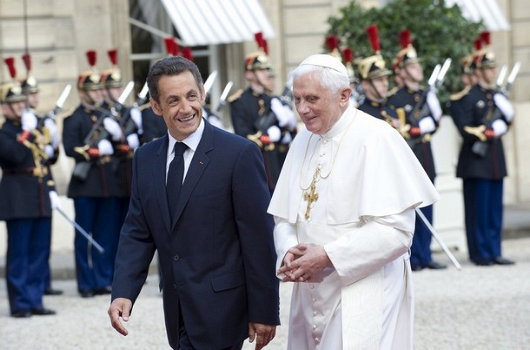
And so, on his way to celebrate the 150th anniversary of the great shrine of Lourdes, the Holy Father came to Paris, to remind France of her roots, of her history, and of her Christian birthright. Benedict XVI has strangely found a friend in the President of the Republic, Nicolas Sarkozy. “Sarko” is France’s answer to a question no one asked — what would it be like if one man were both Bill Clinton and George Bush? — but this non-religious man of Hungarian Jewish extraction has been enthusiastic about replacing the negative “secularism that rejects” with (in his words) a “positive secularism that debates, respects and includes”. Instead of a situation in which the Republic restricts the Church, Sarkozy argues for one in which the Republic and the Church (and the Mosque, and the Synagogue, and the Masonic Lodge…) can peacefully coexist and even interact.
While Sarkozy’s “positive secularism” falls short of the traditional Christian vision of society, Benedict XVI is a pragmatist, perhaps because he is an intellectual. He knows that reason is in the Church’s corner and that the Faith has the intellectual weight of centuries of thought to back it up. If “positive secularism” will free a space for the Church to proclaim the gospel, than it is to be welcomed.
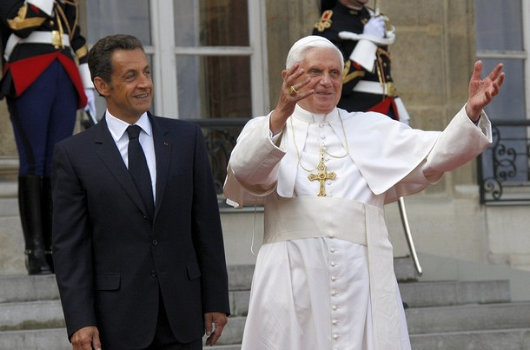
As is custom, the Pope’s first visit was a courtesy call to the President as one head of state to another. President Sarkozy welcomed the Holy Father to the Elysée Palace with full honors. After private discussions with the President, Benedict met with other state officials including members of the cabinet.
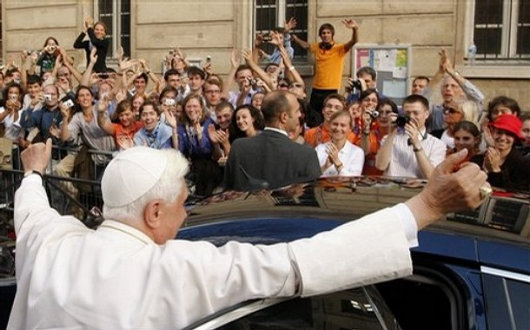
In the late afternoon, the Pope visited the Collège des Bernardins, a medieval monastery which was recently restored and is now a Catholic center for academic research and debate.
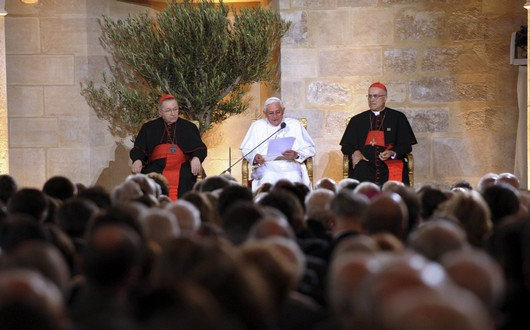
At the Collège, the Holy Father held a “Meeting with the Cultural World”, one year after his famous Regensburg address. With seven-hundred academics, intellectuals, and cultural figures as his audience, Benedict denounced the rampant nihilism which was eating away at the foundations of Europe.
“It would be a disaster if today’s European culture could only conceive freedom as absence of obligation,” the Pope noted. “Absence of obligation and arbitrariness do not signify freedom, but its destruction.”
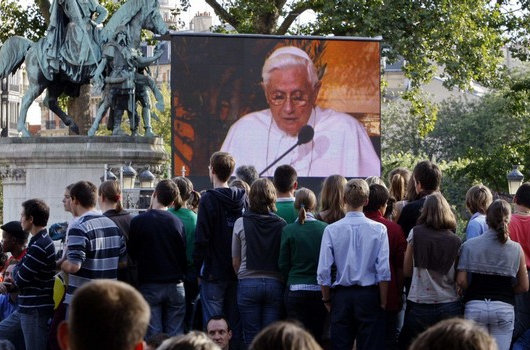
Outside the Collège, many young Catholics watched a live broadcast of the “Meeting with the Cultural World” and were joined by those who were interested in hearing the Pope’s mind.
“God has truly become for many the great unknown,” the Holy Father said. “But just as in the past, when the question concerning the unknown God was hidden and present, so too the present absence of God is silently besieged by the question concerning Him,” he continued. “To seek God and to let oneself be found by him is today no less necessary than in former times. A purely positivistic culture which tried to drive the question concerning God into the subjective realm, as being unscientific, would be the capitulation of reason, the renunciation of its highest possibilities, and hence a disaster for humanity, with very grave consequences. What gave Europe’s culture its foundation — the search for God and the readiness to listen to Him — remains today the basis of any genuine culture.”
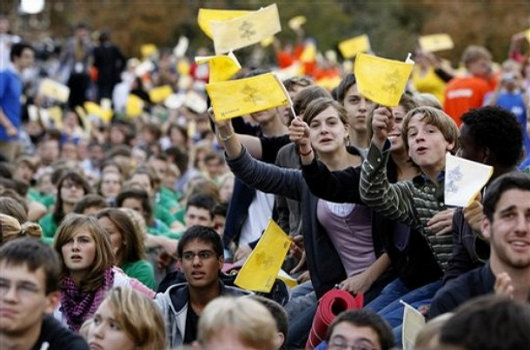
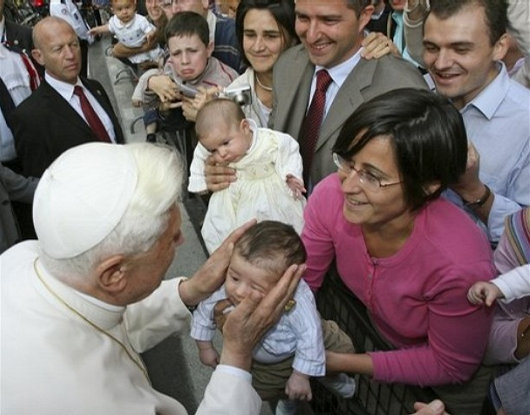
Leaving the Collège, Benedict took a moment to hold and bless a number of babies among those who lined the streets.
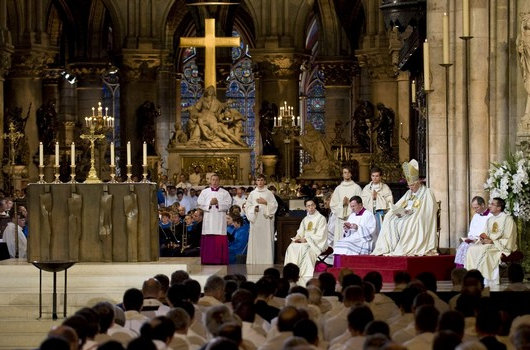
In the evening, Pope Benedict celebrated Vespers at the Cathedral of Notre-Dame with priests, religious, and seminarians, as well as representatives of the Eastern Catholic churches, the Orthodox churches, and the Protestant denominations.
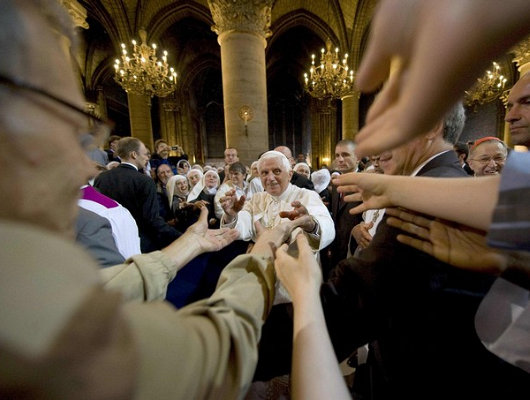
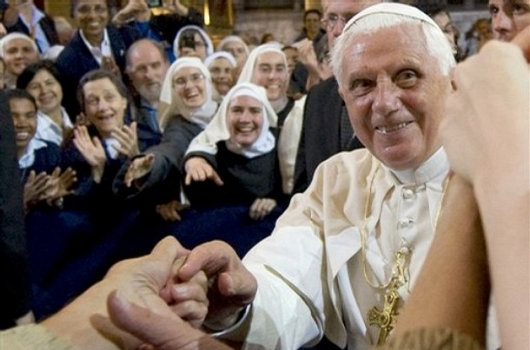
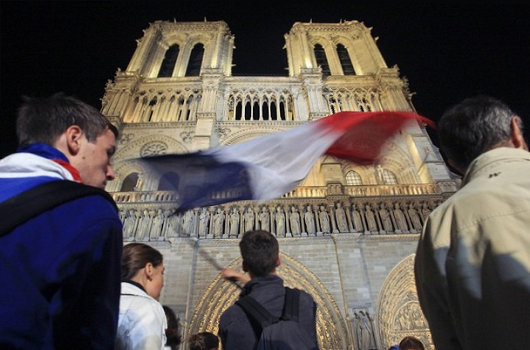
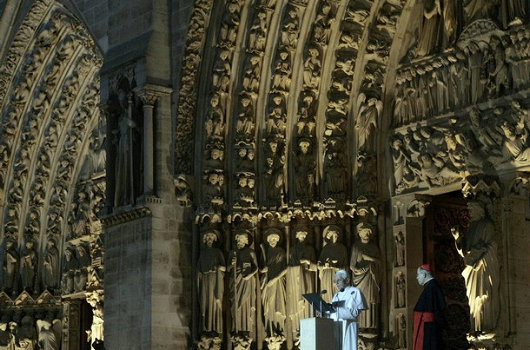
After the finish of Vespers, Benedict addressed the 60,000 people — mostly young — who assembled in the square and the streets surrounding Notre-Dame. In his words, the Pope condemned “fanatical fundamentalism”, which many took to be aimed at radical Islam, but which could just as easily be understood as attacking the atheist nihilism of the European establishment, or the warmongering liberal imperialism of Washington.
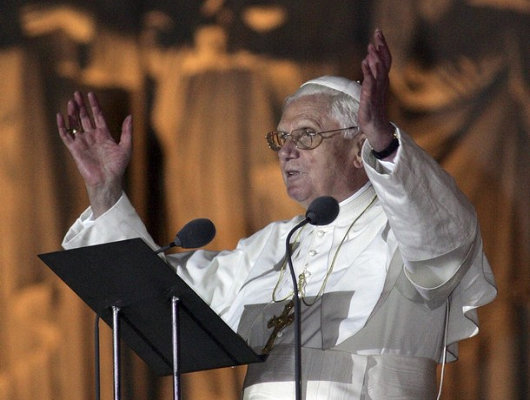
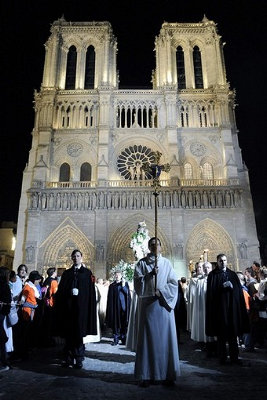
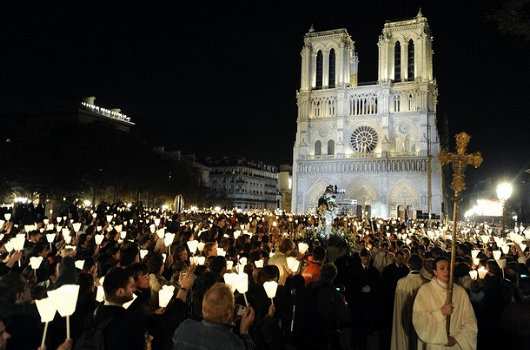
Following the completion of the Pope’s words, a statue of the Blessed Virgin was processed through the streets of Paris, from the Cathedral to the Apostolic Nunciature where the Pope resided during his stay in the city.
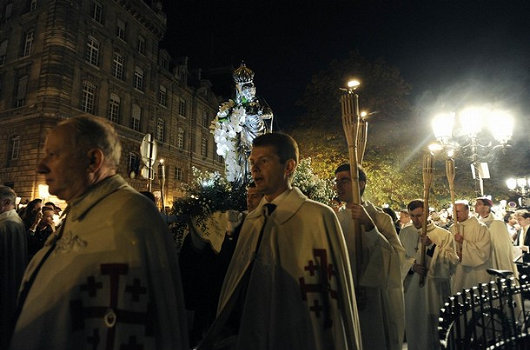
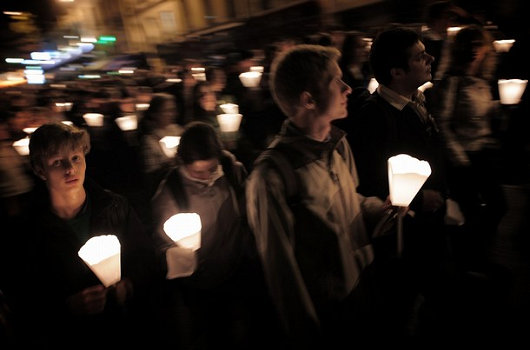
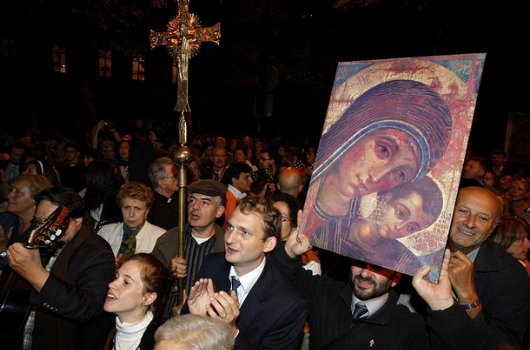
Outside the Nunciature, Catholics young and old gathered, awaiting a few more words of wisdom from the Supreme Pontiff.
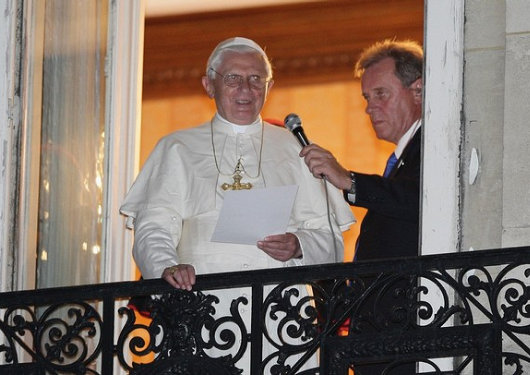
Benedict duly obliged, addressing the crowd from the balcony of the Nunciature before giving them his final blessing of the day.
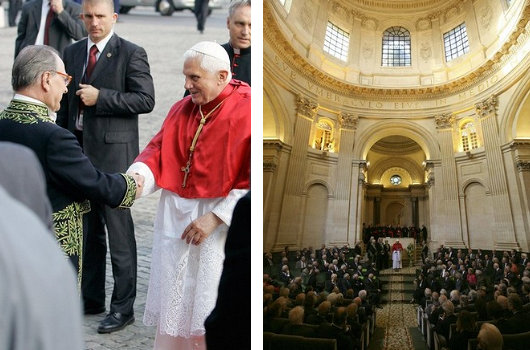
Saturday began with a visit to one of France’s most august institutions, the Institut de France, a learned society composed of the five académies (most famous among them the celebrated Académie française whose members are known as les immortels — the immortals). The Chancellor of the Institut de France welcomed the Pope, who spoke to assembled academicians in the great hall of the institute. While the Institut itself was founded by freemasons from the lodge Les Neuf Soeurs, most of the academies which are now part of it have their origins during France’s Catholic monarchy.
The Académie française, founded in 1635, is the most ancient of the five academies. Corneille, Racine, La Bruyère, Chateaubriand, Lamartine, de Tocqueville, Montalembert, and the latecomer Maurras are just a sampling of the long list of Catholic members throughout history. It has numbered no less than 15 cardinals, 10 archbishops, and 26 bishops among its academicians.
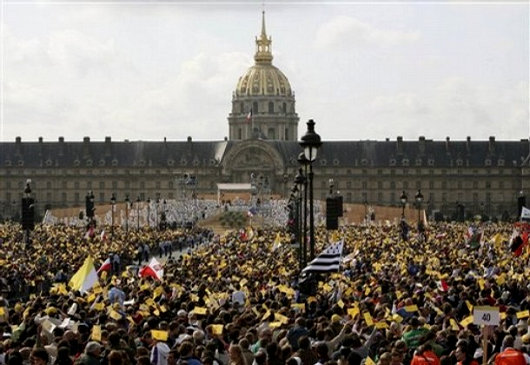
The highlight of the Holy Father’s visit to Paris, however, was the Holy Sacrifice of the Mass, offered on the massive Esplanade des Invalides on Saturday mid-morning.
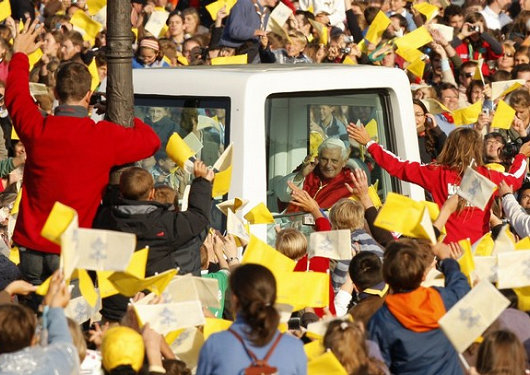
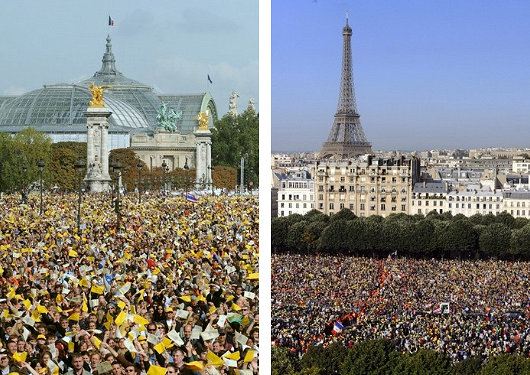
Hundreds of thousands — literally hundreds of thousands — of people attended the Mass.
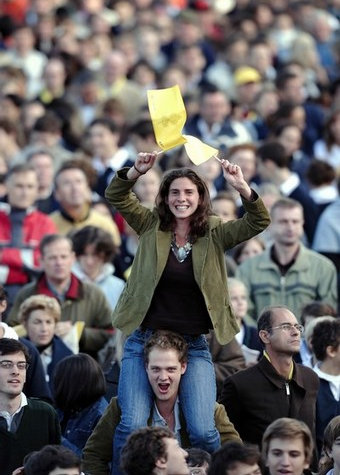
They came to participate in the Eucharist, and to hear what Benedict XVI had to say to them.
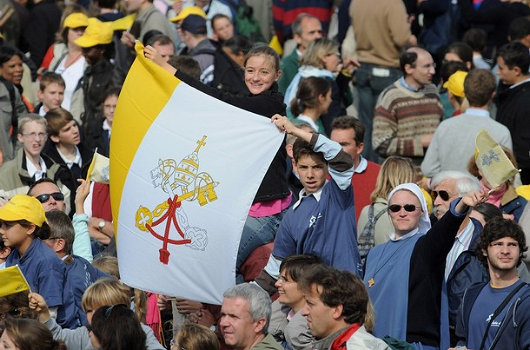
The large congregation listened to the Pope’s homily attentively. The pontiff questioned the assumptions of “post-Christian” culture.
“Has not our modern world created its own idols?” the Pope asked. “Has it not imitated, perhaps inadvertently, the pagans of antiquity, by diverting man from his true end, from the joy of living eternally with God? Have not money, the thirst for possessions, for power, and even for knowledge, diverted man from his true destiny?”
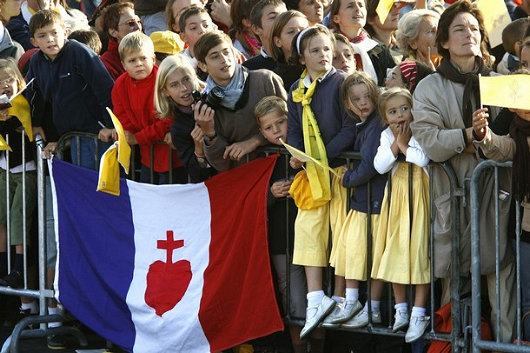
Pointing to sacred scripture, the Pope reminded that “the love of money is the root of all evil” and decried the “insatiable greed” of modern society as a “scandal, a real plague”. Benedict’s words recall the constant reminder of his predecessor John Paul II that a materialist society divorced from the love of God would ultimately self-destruct.
Many of those in the crowd interviewed by the news agencies said that the Pope’s message was exactly on target, and expressed a hope that the numerous government ministers and officials in attendance would take note of the Pope’s condemnation of materialism and strong exhortation towards the love of God.
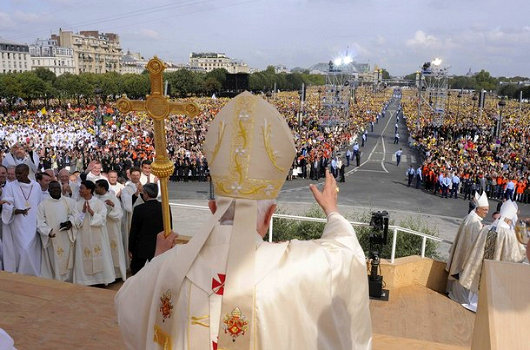
We will not know the true effect of these two brief days the Holy Father spent in Paris for some time. France has some of the most obstreperous bishops, who have thwarted the Pope’s plans for renewing and reforming the liturgy which is central to Christian life. Nonetheless, since the very dawn of the Revolution, the eldest daughter of the Church has had a consistently counter-revolutionary subculture which is large enough to act as an important springboard for the Church. For decades, France’s modernist bishops have cut themselves off from the most consistently lively and reliable part of the Church in France: those devoted to the ancient form of the Roman liturgy. The visit of Benedict XVI will no doubt have provided much inspiration and hope to many of France’s Catholic faithful, but whether the bishops will end their resistance remains to be seen. For the time being, we can hope and pray.
Search
Instagram: @andcusack
Click here for my Instagram photos.Most Recent Posts
- Burns Tower April 19, 2024
- Patrick in Parliament March 18, 2024
- Articles of Note: 13 March 2024 March 13, 2024
- Cambridge March 9, 2024
- Taken on Trust March 4, 2024
Most Recent Comments
Book Wishlist
Monthly Archives
Categories



An excellent article. Wise words from the Bishop of Rome. However, as an Anglican and a Freemason, I cannot help but notice a few subtle jabs in my general direction…
Oh sure! Pope goes to New York, nary a word. Pope goes to Paris, we get the works!
Mr Cusack, you have outdone yourself. A magnificent report about a magnificent man.
Europe does nor deserve him – that it nevertheless has been blessed with him is evidence that God has not yet abandoned us to the fate we so richly deserve.
He is indeed a magnificent man and a wonderful Pope.
I’m heartened by Sarkozy’s tone. For too long, laicite has been accompanied by much too much bitterness. I hope and pray that France can put behind it the overly strong (but, to be fair, rather well founded) reaction against the Ancien Regime. It is helpful that Benedict XVI is very conscious of the problems inherent in too close an embrace between Church and State.
No francophile moi, but the 5% of the French who practice their faith are much more devout than the 60% of their practicing U.S. Catholic counterparts.
The media reports of what percentage of the French are practicing Catholics has varied wildly over the past two days. Some have put it as low as 4%, some as high as 20%.
I myself did a few calculations, including a generous amount of pure naked guesswork, and suspect that the total percentage of church-going Catholics is probably about 10%-12%.
But yes, in many respects, the French traditionalists put us to shame.
A lovely article, with such nice photography. My favorite is the simple, yet all-important shot of the children holding the tricolor emblazoned with the Sacred Heart.
I cannot imagine how refreshing this must have been for French Catholics, who have to put up with the drudgery of laicite.
If this is true:
“Just as Maurras differentiated the two visions of France, we in the English-speaking world know that England is truly a Catholic country that is suffering from a four-century interregnum (and so with Scotland, and Ireland, and America, and Canada, and Australia…). We love our homes but we know they are not truly themselves — they do not truly reflect that idea of their essence — until they enjoy the fullness of Christian communion.”
Then why on earth do you recognize QEII and her horrible German/Greek offspring?
Mrs. P, Maurras did not refuse to recognize the French Republic — anything but — he merely differentiated that it represented an artificial France as opposed to the genuine France of the monarchy.
There are many reasons why we should recognize Elizabeth II, the best probably is that to recognize Elizabeth II is simply a recognition of reality. Who sits on the throne? Who lives in Buckingham Palace? Who ceremonially opens Parliament? Who signs all the laws? She does.
The second is that, since there are no other claimants (the inheritors of the Stuart line having recognized Elizabeth II), the only alternative is a Republic. It is much, much better that the monarchic forms, which are at their essence Catholic, are preserved (albeit by Protestants) than that they would be destroyed.
The choice is between a Protestant monarchy and a liberal republic; I’d choose the monarchy any day of the week. It will be a thousand times easier to re-Catholicize a Protestant monarchy than to Catholicize a liberal republic.
That dispicable dictator Sarcozy. Making Ireland vote again after they voted no to Lisbon. E.U. globalists, the new facists.
We remember during the shadow of Empire when Elizabeth II attracted such crowds. Only a coronation or royal funeral could rival such a mass outpouring these days, but the Pope manages to attract them everywhere he goes.
My dearest Mrs. P: the Queen is the Queen, deal with it!
Andrew (and Mr. Harrington), I actually think the whole Windsor thingummy is much more trickier than she’s the Queen, deal with it or that it is always better (for a Catholic) to choose a monarchy over Protestant monarchy or liberal republic.
First, I don’t believe St. Thomas More would agree with that sentiment. He wasn’t too keen on the Lutheran Reformation and the English one wasn’t exactly his cup of tea either. I suspect he might have believed the Tudor settlement does not pass the sniff test.
The problem with the English monarchy is that it was once Catholic. It did begin as a Protestant one. It became one by breaking with the Church of Rome. How, as Catholics are we to reconcile the claims of our Church with the claims of the current Protestant Queen of England? How can we say God desired schism?
God never desires schism. Man does. And so does this Queen.
God allowed the schism to happen. Why? I can’t tell you. But it was schism that created a Protestant monarchy in England.
Also, is England really a monarchy? Does not the Prime Minister make most, if not all, of the key governing decisions? Including who gets the miters in the Church the Queen draws all of her reigning power from?
Deus o abençoe por este tão inspirado artigo e também pelas bem ilustrativas fotos.
Quando vi a fotografia da jovem aos ombros do jovem, imediatamente a associei com uma célebre fotografia do Maio de 1968, semelhante a esta. Sim é verdade que há duas Franças, como há dois Portugal, como há duas Europas, como há dois mundos: o daqueles que seguem a orientação de Deus e o daqueles que seguem, consciente ou inconscientemente, as directrizes da “antiga serpente”. Não interessa se em França os católicos são 4 ou 20 por cento, o que importa é que esse “pequeno resto” atraia a misericórdia divina a essa “filha primogénita da Europa”; De forma a que, como dizia o general Degaul (?, a Europa seja, um dia, unida do Atlântico aos Urais e, digo eu, tendo como principal directriz a doutrina social da igreja. (Riam-se todos os inimigos da igreja fundada por Jesus em Pedro).
José Andrade
Andrew:
Felicitations! These are absolutelly wonderful. Are you working on a selection from Lourdes? I spent the morning looking for good ones of the Holy Father there, particularly from his prayer at the Grotto and very especially of his face during his personal Eucharistic Adoration. (It appeared that Mgr Marini had to pull him gently out of his contemplation to go on with the service, and that the silent crowd could have taken more as well.) If you could post one of the latter I’ll be eternally grateful. As it is it will live in my memory eternally.
In the meantime please, please, please have a look at blog Pro Papa Flagship. We’d love to welcome you aboard. Sure you’re very busy but solidarity is everything. I’m Jane on Papa in France on that blog by the way.
I thank God for you talent,
In Christo pro Papa
In Papa pro Christo,
Jane
My dear Mr Cusack, Charles Maurras was an anti-Semite, and deal with that! Deal with the fact that most of the members of the Vichy government were Action Francaise boys and the cause of the demise of Catholicism in France after WWII lies right there.
Considering that Action française was condemned by the Pope years before the Vichy regime even existed, it’s rather specious reasoning to lay the credit for Vichy at the Church’s door, wouldn’t you say?
And, you will no doubt recall from what I wrote above (twice), Charles Maurras only became a Catholic at the end of his life, though much of his thinking was influenced by Catholicism.
All things considered, my dear Francesca, there’s not much to deal with, is there?
First, I don’t believe St. Thomas More would agree with that sentiment.
On the contrary, Mrs. P. You will recall that St. Thomas More was more than happy to render under Caesar that which was Caesar’s. Henry VII may have been a schismatic and heretic and all that, but the Good Saint was willing to obey him in all secular matters, because that was as far as the King’s authority extended. It was the King’s usurpation of spiritual authority that St. Thomas More objected to.
Recognizing the Queen as Queen in no way requires one to recognize her as Supreme Governor of the Church. The religious oaths of office-holders have been abolished.
How, as Catholics are we to reconcile the claims of our Church with the claims of the current Protestant Queen of England?
Our Church makes no claims as to the illegitimacy of Elizabeth II’s rule; the Church rejects the Protestant religion, it does not claim that any Protestant who is in a position of power is automatically deposed.
By your logic, Mrs. P, how are we to “reconcile the claims of our Church” with the current Protestant President of the United States? Do you not recognize the government of the United States on this basis?
How can we say God desired schism?
Who claimed God desired schism?
Also, is England really a monarchy? Does not the Prime Minister make most, if not all, of the key governing decisions?
It nonetheless retains monarchic forms and the Crown is still the fount of authority. It is probably foolish that the Crown delegates most of its authority, but at least it still 1) exists, and 2) has authority.
Including who gets the miters in the Church the Queen draws all of her reigning power from?
Here you show your completely incorrect conception. It is the Anglican Church which draws all of its power from the Crown, not the Crown which draws all of its power from the Anglican Church. The Anglican Church is a creation of the government, not the other way round.
At the heart of the matter, you need to separate, as the Catholic Church does, secular authority from spiritual authority. The Queen holds the secular authority in Great Britain (and Northern Ireland); she does not hold the spiritual authority (though Anglicans incorrectly believe she does). The Church teaches that Catholic Britons owe the Queen their allegiance in temporal matters, but not in spiritual.
A Mayor of Detroit can falsely claim spiritual authority over Detroit, but that would not mean he would cease being Mayor. The fact that the Crown claims spiritual authority it actually lacks does not negate or cancel the fact that it still has temporal authority.
” It was the King’s usurpation of spiritual authority that St. Thomas More objected to.”
I think, if you look, Henry VIII making himself the head of the English church and the Archbishop of Canterbury merely his patsy on all things spiritual would have been a big problemo for St. Thomas More…and Henry used his kingly powers to make this happen…his kingly powers he got from God…
But I’m tired, and the Mayor of Detroit has decided to move in down the street…in 2 weeks they say…the dumpsters arrived 4 days ago….so the wine is chambre-ing and Mr. P is on his way home from work and I will return tomorrow to throw my back into it….
Thought this was a great article and the photos so lovely
(Papa Benedict blessing the babies – so gorgoeus.)Am a french teacher and will be sharing this article with my pupils.
Spend a lot of time in France and feel for for the practising french catholics and their priest ,but am quite sure “Theirs will be the kingdom of heaven”
How many great Saints France has produced.
May St Joan of Arc pray for and protect this beautiful country .
Yes am waiting for a Lourdes article and photos too.
Apologies for the spelling errors above I need glasses!
Mr. Cusack,
Well done. A most beautiful photo journal of the Pope’s visit to the City of Light. I second Jane’s request, if it is possible, for images from Lourdes, especially of Papa Benedetto transported in prayer before the Blessed Sacrament.
What is Mrs. Peperium’s malfunction? The Pope supported the Hanoverians at the Battle of the Boyne. The Pope recognises the House of Windsor. It is the Pope who decides these things. About the simple fact that Elizabeth Mountbatten-Windsor is Queen of England, whether Mrs. Peperium likes it or not, there can simply be no question.
Oh yes! Great post, Cusack! Keep up the good work. (I especially loved the Republican-Monarchists with their Vendeen Tricolor. Great stuff!)
Actually I do not have a malfunction, thank you very much. The malfunction is among the monarchists who support Elizabeth II.
Have you read her coronation service? Try it. And then try to make the case she is a secular Queen. It is wrong to say Elizabeth does not rule over the Church of England. Only she has the final say in matters, not the Archbishop of Canterbury. She just has chosen not to use that power. But her predecessors have. And her son intends to as he is planning and this means he will be called the Defender of the Faiths.
Oh and I must add, that if Prince William is intending on marrying Kate Middleton, that it will be most amusing for all the palace hacks to make the case why it is no longer necessary (thanks to birth control and abortion) for the future King of England to marry a virgin. Prince William’s father was required to marry one and Princess Diana did have to go to the doctors to prove she was.
Mrs. P! For the last time!
The Queen claims to have BOTH secular AND religious authority. You refuse to name any reason why her claim to religious authority negates her claim to secular authority. One word: why?
The Church recognizes the Queen’s temporal power while pointing out that obviously her simultaneous claims of spiritual authority are completely null and non-existent. What part of that don’t you get?
The Crown is a power that makes various claims to authority: some of its claims are legitimate, others aren’t. So we follow where its claims are legitimate, and we do not when its claims are not legitimate.
If a mother tells his son to clean his room, he obeys. If he tells her to commit a sin, he refuses.
Simple!
Andrew, I hope your time at the horse trials was not in the least trying. It’s fun to watch horses, huh?
Now as far as this:
“The Church recognizes the Queen’s temporal power while pointing out that obviously her simultaneous claims of spiritual authority are completely null and non-existent. What part of that don’t you get?”
I totally understand that. No problem with it what so ever. My issue has never been with the Church. My issue has been with the besotted Catholic monarchists like you who march, decked out in your best country togs, in lock step behind the Windsors.
I also suspect and perhaps the Church does as well that since Elizabeth II is not actually who she claims to be or nor who her coronation service says she is that she isn’t a very good monarch….in fact she’s a lousy one if you look at England’s overall cultural trajectory during her reign and with her son, Prince Chowderhead next in line, England will only fall that much farther….
Do you know the ultimate irony of Elizabeth’s reign? Well, the most ironic happening so far…
If Elizabeth II had held fast to the teachings of the C of E rather then letting them become the prime target of Modernism, then divorce would still be a major no-no. But Elizabeth did not hold fast to any teachings. And so, her two boys went on to marry. Charles married Diana and Andrews married Sarah. Both of those girls came from families destroyed by divorce.
Those two marriages would never have taken place as the girls would have been deemed unsuitable. Which the entire world eventually found out the hard way…
Maurras couldn’t have spoken truer words about France.
As to the bishops, traditional Catholics have been heartened to see Paris Archbishop Vingt-Trois’s openness to the extraordinary form in several parishes; the traditional Mass is increasing in number and frequency all throughout France. There are still the scattered strongholds that stubbonrly refuse to grant permission for one excuse or another–but the old Mass is indeed returning.
Comments are closed.